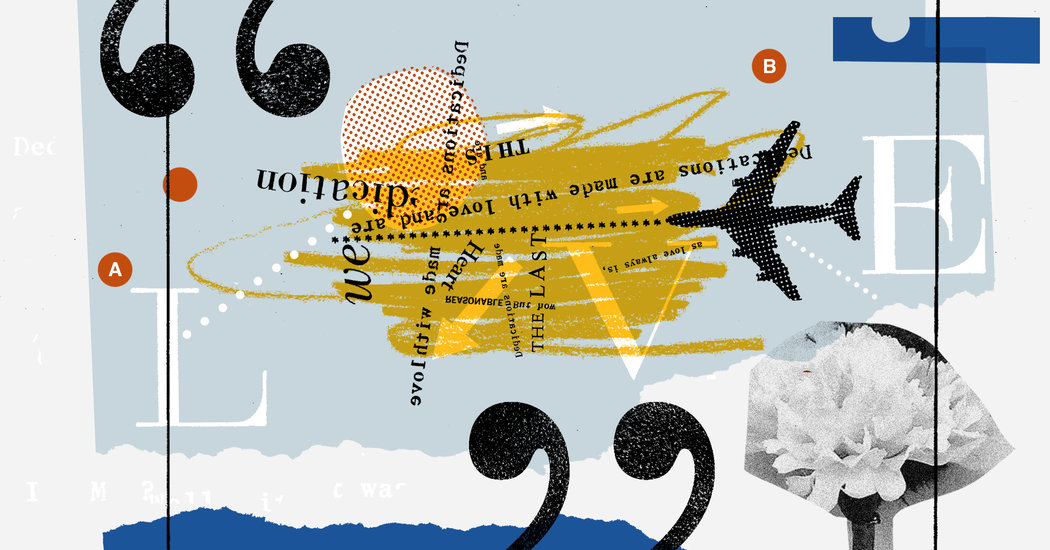
My father was married twice before I was born, once to a woman I met much later and once to my mother. When he asked me to speak in August at the reception of his third wedding, I believed it something I was incapable of doing: What could a son say about marriage to a father who had divorced twice, seeming to treat love as though it were seasonal?
I lived with both parents as a child, but somehow the earliest memory I have of my father is of calling him one night when I was 7 and he was traveling. We were three time zones apart, but my mother was able to reach him at his hotel room so I could tell him I could not sleep. I was worried about dying, the way other children might be afraid of the dark. I remember him consoling me, and his ability to be there for me — by phone, by any means necessary — grew as I grew.
My parents divorced amicably when I was 14, but eventually the turbulence of youth presented its challenges and I found myself passing through rehabs on my way to college. I kept a bag ready to go at any moment, traveling often between people and places, desires and disasters. I was an anxious, world-weary and troubled young man. Perhaps because of this, my father visited me wherever I went, if only to give me grounding.
Whether I was at a rehabilitation center in Utah; a military academy in Pennsylvania where I had asked my parents to send me post-9/11 when I was too young to enlist but eager to serve; a stifling hotel room in Miami; an unfurnished condominium in Juneau; or a rundown apartment complex in Savannah, my father would drive or fly to see me, sometimes for only a few short hours.
When I stayed for several years in Georgia, I battled anxiety and depression, both the reason for and product of my constant travels and indecision. I adopted a cat, Noel. On the phone one night, my father told me to hold the cat and let the anxiety wash away. I did, and it worked. For a moment, I felt the onset of love.
Noel traveled everywhere with me. We lived in all but one borough in New York City. We drove through more than a dozen states and many apartments and homes in between. In Queens, I met a woman who hated cats but changed her mind when she met Noel. She started playing with him more than I did.
In those years, my father’s visits took the form of meeting for meals in the city. He liked my girlfriend, happy for our decision to move in together, at times comparing my dating life to his own.
He dated several women after the divorce. I felt at times like the divorce was so typical that it was more cliché than disaster. But at other times I felt it stood for something fundamental: the abandonment of a promise to remain a single unit against changing landscapes and shifting emotions. In the coming years I liked a few of my father’s girlfriends, disliked many others, but mostly I was happy when we spent time together, despite the revolving door of women.
On the night before I married the formerly cat-hating girlfriend, my father flew to meet me in Boston where I was teaching a class. We would fly the next morning to New York where he would stand with me under the traditional Jewish huppah.
At dinner on the eve of my wedding, my father asked me what I would do differently in my “first marriage” than he did in his. I wanted to snidely ask which marriage he meant, but knew he was talking about my mother. “I’d listen more,” I said. “And I’d venture to be present, always.”
We shared a moment and he said, “Your mother has always been so close to your sister and I have always been so close to you because your mother and I each yearned for ‘love.’ My thinking is that my father and mother were very happy together, perhaps always ‘in love,’ and so they did not desperately need the love of their children.”
I thought of Noel and my fiancée and our future together. I wanted to tell my father that my one true goal in marriage, of true love, was never divorce. Until then I had seen the divorce as a black mark on our family’s history. To me it had meant that my father was not loving, but rather self-serving. What I failed to notice was that while he and my mother had split, he kept the flame of our family’s love alive not in marriage, but through his travels.
In the coming years he flew to see me while working in London, offered to host me at his apartment in Miami, and traveled to Normandy to accept a journalism award on my behalf. I was attending my cousin’s wedding at the time and could not attend the ceremony. His attendance made him my virtual appendage, a constant companion, being there whenever or wherever I needed him.
So for his wedding I prepared a speech. It was about time, about how he channeled his love through me, his son. It was about how I would travel with my wife, then pregnant, on a plane, three trains and a taxi to reach the boat on which my father and stepmother would be married. It was about the way his love followed me and now mine follows my father, the way I hope my son, now 3 months old, will reciprocate my love for him.
Most of all, the speech was about how I came to his wedding with my own family. My sense of home and place and belonging and family resided not within four walls but, like my father’s, at their side wherever they are.

